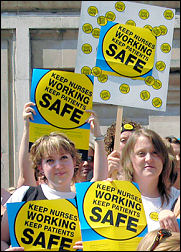 ISSUE AFTER issue of the socialist has featured the crisis in the
ISSUE AFTER issue of the socialist has featured the crisis in the
health service under New Labour. Dozens of hospital trusts have declared
cuts as a result of their "going over budget". Newly trained nurses
fresh from college are being told there are no jobs for them, as the
trusts declare redundancies, closures and cutbacks.
This has been going on for well over two years. It is a result of the
government’s policy of refusing to cover spending in the trusts in order
to: "introduce fiscal discipline".
At the same time, the government continues to privatise more and more
of the service, the latest being NHS Logistics.
Private capital is licking its collective lips at the thought of the
huge profits to come, as they are allowed, indeed encouraged, by New
Labour to cherry-pick the most profitable parts of the NHS.
One feature of NHS top management’s strategy is the huge increase in
management consultants they have brought in. Accountancy Age magazine
boasts that the NHS now uses more consultants than the whole of
manufacturing industry, an increase over last year of 26%.
Not since the poll tax days has there been such awareness amongst
ordinary people that something is wrong and it should be stopped. The
growing support for the TUC-organised lobby of parliament on 1 November
is one indication of these developments.
The movement is not uniform yet. The more rural areas and smaller
towns have been the first to move. Mass demonstrations, reminiscent of
the early days of the anti-poll tax campaign, have been held. But now
the bigger towns and cities are feeling the cold wind of market forces
on their local health services.
Who will put themselves at the head of this movement? It has to be
the trade unions, whose members not only work in the NHS but also depend
on the existence of a NHS which is available "free at the point of use".
Unfortunately, the union leaders, like Dave Prentis of UNISON, seem
to be the last to recognise this. Many fine speeches have been made
about the crisis but what has been lacking up to now is a strategy to do
something about it.
The only conclusion you can come to is that the union leaders are so
tied into the Labour Party that they hope against hope Gordon Brown will
change tack when he is the leader.
But the only thing that the government will listen to is action. That
is why it is even more important that the initiative of a number of NHS
campaigns to organise a feeder march from south London to the lobby of
parliament on 1 November is supported by the unions and their NHS
members.
A national day of action should be organised soon after the lobby to
pull together the workers in the hospitals and the people in the
communities. A day of action that included industrial action – with
trade union-controlled emergency cover – for those services under direct
threat of cuts would be a tremendous beacon to the whole of the working
class. The unions could demonstrate that they are the real defenders of
a publicly owned and publicly run NHS.
Just as important, the same union leaders have to break themselves
away from the clapped-out idea that things can be changed through the
Labour Party and the trade unions’ link with it. The battle to save the
NHS is a political struggle as well as an industrial one. That requires
a new political voice for working people. In other words, a new trade
union-based mass workers’ party.







